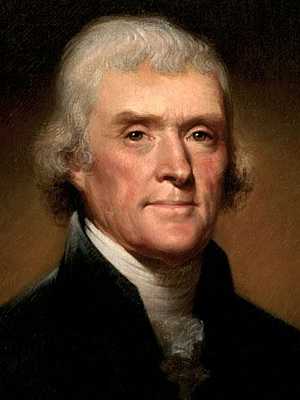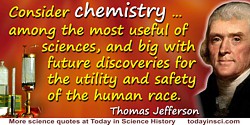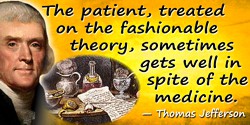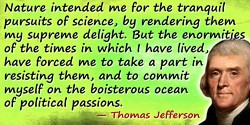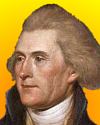 (source)
(source)
|
Thomas Jefferson
(13 Apr 1743 - 4 Jul 1826)
American statesman, astronomer, scholar and inventor who wrote the Declaration of Independence (1776) and organized the Lewis and Clark expedition (1803). His only full-length book, Notes on the State of Virginia contains an outline of the geography, flora and fauna of Virginia, and established his reputation as a scholar and a pioneering American scientist.
|
JEFFERSON AS A MAN OF SCIENCE.
from Preface to The Writings of Thomas Jefferson, Volume 19.
[p.iii] It is an interesting tribute to the value of the scientific mind that two of the men among the most important in the establishment of the United States of America were at the same time its earliest and most distinguished students of the natural and physical sciences, Benjamin Franklin and Thomas Jefferson, and while the time of both of these men was largely given to public affairs, their chief intellectual interest lay in the discovery and the setting forth of new truths. Jefferson wrote to a correspondent, “Nature intended me for the tranquil pursuits of science, by rendering them my supreme delight,” but he was likewise impressed with the fact that there was a relationship between science and republican institutions. To Monsieur d'Ivernois he uses the phrase: “Freedom, the first-born of science,” and to General Kosciusko he says: “The main objects of all science are the freedom and happiness of man,” while to another correspondent he declares that “Science is more important in a republican than in any other government.”
The first public demonstration of Jefferson's capability as a man of science was the preparation and [p.iv] publication in 1781 of his “Notes on Virginia.” “This,” according to the late G. Brown Goode, assistant secretary of the Smithsonian Institution and the historian of American science, “was the first comprehensive treatise upon the topography, natural history and natural resources of one of the United States, and was the precursor of the great library of scientific reports which have since been issued by the State and Federal governments. Though hastily prepared to meet a special need, if measured by its influence it is the most important scientific work as yet published in America.” In this work he successfully overthrew many of the arguments of Buffon, who was at the time considered the highest living authority on natural history subjects; and later, when he came to know Buffon in Paris, the latter admitted some of the errors that he had made.
In a valuable paper published in the Magazine of American History for 1885, Frederick C. Luther points out that Jefferson “had a more or less practical knowledge of surgical anatomy, civil engineering, physics, meteorology, mechanics and astronomy, and was at home in many departments of pure and applied science, but it was in natural history that he was most interested, and as a naturalist he made his only original contribution to scientific knowledge.” * * * “He seems to have acquired nearly all the knowledge the world then possessed of geology and zoology, and while many of the theories advanced in his ‘Notes on Virginia’ have been rejected by [p.v] modern science, in some of his conclusions Jefferson was quite in advance of the best specialists of the age, and notably so in the department of palaeontology.”
In fact palaeontology in the United States had its beginning in a paper filed with the American Philosophical Society by Jefferson under date of March 10, 1797, announcing his discovery of the Megalonyx Jeffersoni; this paper was published under the title, “Memoir on the Discovery of a Quadruped in the Western Parts of Virginia,” in the Transactions of the American Philosophical Society. The original specimen was deposited in the American Philosophical Society and subsequently transferred to the Academy of Natural Sciences of Philadelphia, where it may still be seen. The announcement of this discovery was coincident with his arrival in Philadelphia to be inaugurated as Vice-President of the United States, and upon that occasion he brought with him a collection of fossil bones of the specimen in question, which he had obtained in Greenbrier County, Virginia.
But his interest in palaeontology did not stop here. In February, 1801, during the excitement of the contest with Aaron Burr, he was corresponding with Doctor Wistar with regard to some bones of the mammoth which he had just procured from Shawangunk, in New York.
In 1808, when the excitement over the embargo was highest and his policy was under the severest denunciation, he was carrying on palaeontological [p.vi] studies in the White House. Under his direction upwards of 300 specimens of fossil bones had been brought from the famous Big Bone Lick, and spread in one of the large unfinished rooms of the Presidential mansion. Doctor Wistar was asked to come from Philadelphia and select such as were needed to complete the collection of the Philosophical Society. The exploration of the Lick was made at the private expense of Jefferson, through the agency of General William Clarke, and this may fairly be recorded as the beginning of American governmental work in palaeontology.
But palaeontology was not the only scientific subject which engaged his attention. He was, when Secretary of State in Washington's Cabinet, chairman of a committee organized by the American Philosophical Society in 1792, to collect materials for the natural history of the Hessian Fly, whose ravages in the wheat-fields threatened so great a danger to the prosperity of the country. This appears to be the first organized effort in economic entomology in the United States.
He was greatly interested in the discovery and cultivation of plants useful in agriculture. He had a table beautifully drawn up, giving the average earliest and latest appearance of thirty-seven varieties of vegetables in the Washington market during the whole eight years of his Presidency, and on his journeys abroad he was always looking out for new plants which might with profit be transplanted [p.vii] America. When in later life he drew up a list of the services he believed he had rendered his countrymen, he enumerated, along with the disestablishment of a State Church, the abolition of entails, the prohibition of slave importation, and the drafting of the Declaration of Independence, “the introduction of olive plants and heavy upland rice into South Carolina and Georgia,” declaring that “the greatest service which can be rendered to any country is to add a useful plant to its culture.”
His interest in agriculture even went in the direction of the invention of a new plow. As far back as 1788 Jefferson entered upon some speculations concerning the improvement of plows, and attempted to sketch an original and uniform mathematical rule for shaping the mould-board of a plow, the object being to secure the regular inversion of a certain depth of the surface soil with the least application of force. By 1796 his new plows were in use. A Mr. Strickland, a member of the English Board of Agriculture, being on a visit to Monticello, saw there plows in operation constructed on this principle, and mentioning them favorably on his return, the Board, through its president, Sir John Sinclair, requested from Mr. Jefferson a model and a description. These were forwarded to England in 1798. The description was published in the Edinburgh Encyclopaedia and in the fourth volume of the Transactions of the American Philosophical Society. The invention also attracted attention in France. He is likewise [p.viii] credited with being the inventor of the copying press. He made observations in meteorology and had a good collection of philosophical apparatus.
It has been declared by Mr. Goode that “it is probable that no two men have done so much for science in America as Jefferson and Agassiz—not so much by their direct contributions to knowledge, as by the immense weight which they gave to scientific interests by their advocacy.”
This statement is fully borne out by the impetus which Jefferson gave to the relationship of the Government to scientific work. The inception of the system of scientific surveys of the public domain was the outcome of more than twenty years of earnest endeavor on his part. It was he who suggested to John Ledyard, of Connecticut, the enterprise of exploring the western part of our continent by passing through St. Petersburg to Kamchatka, and procuring passage in some Russian vessel to the United States—a project which failed because of the arrest of Ledyard. In 1792 he proposed to the American Philosophical Society to set on foot a subscription to explore the great West, and for this subscription became responsible for raising one thousand guineas. This was to have been undertaken jointly by Captain Meriwether Lewis and Michaux, the botanist, but it also failed. In 1803 he recommended to Congress in a confidential message, the sending of an exploring party to trace the Missouri to its source, to cross the highlands, to follow the best water communication [p.ix] which offered itself from thence to the Pacific Ocean. Congress approved the proposition and voted a sum of money for carrying it into execution. Captain Lewis, who had been with Jefferson nearly two years as private secretary, immediately renewed his request to have direction of the party. The second expedition toward the West was also sent out during Jefferson's administration, being that under command of General Z. M. Pike, who was sent to explore the sources of the Mississippi River and the western parts of Louisiana, continuing as far west as Pike's Peak, the name of which still remains as a memorial of this enterprise. It was during Jefferson's administration, too, that the project of founding the Coast Survey arose. This was recommended to Congress by the President in 1807.
It was under his Presidency that the idea of Washington for the establishment of a Military Academy at West Point was fulfilled, and Jefferson also had a plan, realized later, for the establishment of a National Observatory. It was he who proposed the unit of the present coinage of the United States.
He was elected President of the American Philosophical Society in January, 1797, and held that office until 1814, when he resigned on account of his age. His connection with the Society, as may be seen from the statements above, was by no means perfunctory. During his residence in Paris he kept four of the principal American colleges, Harvard, Yale, William and Mary, and the College of Philadelphia, [p.x] informed of all that happened in the scientific circles of Europe. Even such a subject as aerial invention attracted his attention. His letters of 1785 contain several references to the Montgolfier balloon. At a time when the natural sciences were but little cultivated in the established universities, he wrote to Doctor Willard, the President of Harvard, urging their pursuit. “What a field,” he said, “have we at our doors to signalize ourselves in. The botany of America is far from being exhausted, its mineralogy is untouched, and its natural history or zoology, totally mistaken and misrepresented.”
His devotion to science, coincident with his active public life and the bitter enmities which it engendered, gave the opportunity for much public criticism, yet it afforded Jefferson, as it did to Franklin, especial consideration as representative of the new nation in France; it earned him election in numerous learned societies in Europe and gave an impetus to the organization of science both in the learned societies, in the colleges and in connection with the Government of the United States, such as could only have been exercised by a man who had occupied the exalted office of President of the United States.
- Science Quotes by Thomas Jefferson.
- 13 Apr - short biography, births, deaths and events on date of Jefferson's birth.
- Thomas Jefferson on Education and Science from a report on establishing the University of Virginia (1818).
- Thomas Jefferson - context of quote “To indulge in the rich fields of nature” - Medium image (500 x 250 px)
- Thomas Jefferson - context of quote “To indulge in the rich fields of nature” - Large image (800 x 400 px)
- Thomas Jefferson - context of quote “The plough ... is really like sorcery” - Medium image (500 x 250 px)
- Thomas Jefferson - context of quote “The plough ... is really like sorcery” - Large image (800 x 400 px)
- Thomas Jefferson - context of quote “Chemistry … among the most useful of sciences” - Medium image (500 x 250 px)
- Thomas Jefferson - context of quote “Chemistry … among the most useful of sciences” - Large image (800 x 400 px)
- Thomas Jefferson - context of quote “The patient … sometimes gets well in spite of the medicine. ” - Medium image (500 x 250 px)
- Thomas Jefferson - context of quote “The patient … sometimes gets well in spite of the medicine. ” - Large image (800 x 400 px)
- Thomas Jefferson on Quack Medicine - from Letter to Dr. Caspar Wistar (1807)
- Thomas Jefferson - context of quote “Nature intended me for the tranquil pursuits of science” - Medium image (500 x 250 px)
- Thomas Jefferson - context of quote “Nature intended me for the tranquil pursuits of science” - Large image (800 x 400 px)
- Thomas Jefferson - context of quote “The ocean ... like the air, is the common birthright of mankind” - Medium image (500 x 250 px)
- Thomas Jefferson - context of quote “The ocean ... like the air, is the common birthright of mankind” - Large image (800 x 400 px)
- Thomas Jefferson: Scientist, by Edwin Thomas Martin. - book suggestion.
